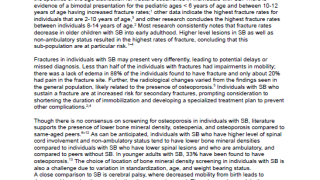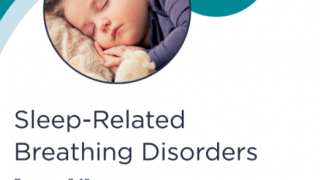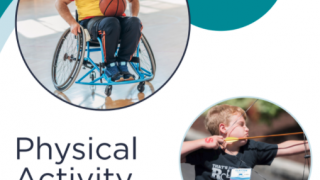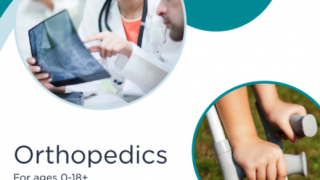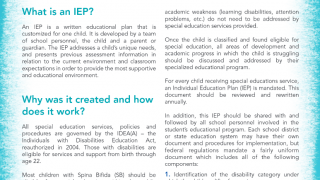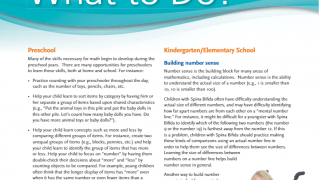Children with SB may require extra support in school.
To help your child be successful in school, it is important to learn about evaluation and testing, getting into the right schools and classes, getting the right services and meeting your child’s social and emotional needs.
To provide the right educational environment for children with SB and Hydrocephalus, teachers and counselors need to identify children’s strengths as well as areas where they need more support. For that reason, special testing is required. These tests help them learn more about a child’s intellect, achievements, and general social and emotional functioning:
- Intelligence testing
- Academic testing
- Visual motor testing
Other tests might be given to help teachers and counselors learn more about a child’s:
- Language ability
- Learning skills
- Social/emotional functioning
To get special services at school, the government requires these tests. Some people believe that the tests won’t help since their children are being compared with others who don’t have disabilities. But for children with Spina Bifida, there are comparison data which provides substantial support for testing. This helps school systems and the right schools, classes, and services.
Children with Spina Bifida and hydrocephalus often have:
- Average IQs. But every child is different. So there can be a broad range of scores on IQ tests among children with Spina and hydrocephalus—from exceptional performers to those with learning difficulties.
- Also, health problems may negatively impact performance.
- Word skills and IQs that are higher than performance skills.
- Poor eye-hand coordination. This can make things like handwriting difficult.
- Higher grades in reading and spelling than in math. (See SBA’s reading and math competencies information sheets.)
Other things to know:
- Verbal IQ scores are better at predicting how well a child will do at school than other parts of an IQ test.
- The more the spinal cord is damaged, the greater the chance that a child will have learning problems.
Even when children are very smart, other things will affect how well they do at school. These things are memory, comprehension, attention, impulsivity, sequencing, organization, and reasoning.
Memory, attention, sequencing, reasoning, etc. should be checked along with IQ. They are usually checked during a neuropsychological evaluation. These types of tests might check a child’s ability to pay attention, impulsivity, or verbal learning. Once parents, teachers, and counselors learn as much as they can from these tests, they must then use what they learned to help children get the most from their school experience.
Testing for everyone
Some parents ask if their children should have psychological or neuropsychological tests when they are already doing well at school. If a child is in early grades, it is important to have these tests done so future problem areas can be addressed early. It is especially important to learn about things like sequencing, organization and problem-solving. When children have problems in these areas, they tend to have less success as school gets harder. A difference usually is seen in 4th grade.
Interpreting test results and placement
Knowing how to read the results and make decisions based on test scores is crucial. A child with Spina Bida and hydrocephalus may have an average score on verbal IQ but below average in nonverbal IQ. This often makes the overall IQ score slightly below average. This does not necessarily substantiate placing a child in a class for those with severe learning problems. Parents and educators must know that verbal IQ is usually better at showing the child’s overall functioning than the nonverbal IQ score.
This is true for two reasons:
- The nonverbal IQ is lowered by having Spina including hydrocephalus and Chiari malformation
- Research shows that verbal IQ is better at showing how well a child with Spina Bida will do in school than the other test score
Understanding this distinction is vital to ensure the provision of the classes and services that are best for the child’s needs. A psychologist can further explain the details. Like all children, those with Spina and hydrocephalus can be placed in a range of classes. Parents, educators, health care professionals and sometimes children must work together to choose the best option, which can become part of the child’s Individual Education Plan (IEP).
Learning problems
Beyond getting a child into the right classes, there are other decisions to make. Parents often ask how to work with the school if their children have perceptual-motor, inattention, memory or other learning problems, but are in regular classes. Teachers often see these problems and will work with the parents and children. If a child is receiving special education services, the parent can ask that these problems be addressed in the IEP. More can be found in the SBA fact sheet “Learning Among Children with Spina Bifida.”
Emotional Independence
Parents often hear from schools that their children aren’t doing well because they are too dependent on the parents. Like all children, those with Spina may try to avoid schoolwork, chores or personal care. This is normal. At the same time, some children with Spina Bida and hydrocephalus can become too dependent on parents or others for things that they can do for themselves. Parents should be able to acknowledge this so they can help their children achieve emotional independence.
Homework
When a child has trouble with physical movement, board work and homework can be a problem. Most children with disabilities can identify alternative ways to learn. Therefore, it is often helpful for a child to have less homework as long as he or she is learning. Computers and calculators can be used to help with written work and math, which are often problems for children with Spina Bifida and hydrocephalus.
Medications for ADHD
Some children require medication if they have problems paying attention or are easily distracted. These children might have Attention Deficit Hyperactivity Disorder (ADHD). To know if a child has ADHD, he or she must see a health care provider who specializes in mental health issues. If the health care provider says the child has ADHD, then medications might be used. One indicator of successful treatment is a behavior change that is evident at home and school.
Conclusion
Parents, teachers, older children, and others must be aware of all these issues to provide the best education possible for children with Spina Bida and hydrocephalus. Children with Spina Bifida and hydrocephalus often have problems at school. So it is important to always focus on the child’s best interests.
This information does not constitute medical advice for any individual. As specific may vary from the general information presented here, SBA advises readers to consult a qualified medical or other professionals on an individual basis.
Resources
I’m interested in resources related to:
Tags

